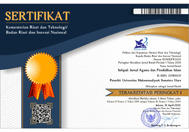Integration of the Future Islamic Education Curriculum: A Comparative Study of Malaysian KSSM and the 21st Century Values and Competency Based Singapore Curriculum
Abstract
This study aims to compare the Islamic education curricula between Malaysia and Singapore by analyzing the KSSM (Kurikulum Standard Sekolah Menengah) and the 21st-century competency-based curriculum in Singapore. The main objective is to explore the integration potential of Islamic spiritual values with multicultural values in the context of ASEAN regional education. This qualitative research adopts a library research method with a comparative approach, involving document analysis and content interpretation of official curriculum documents from both countries. The findings reveal significant differences in curriculum structure, pedagogical approaches, value orientations, and integration of 21st-century competencies. Malaysia emphasizes spiritual and religious values rooted in Islamic traditions through a structured, thematic curriculum, while Singapore promotes a multicultural and value-neutral approach, with strong emphasis on global competencies and critical thinking. The study concludes that an integrative curriculum model combining Malaysia’s spiritual foundation with Singapore’s multicultural perspective may enhance the development of a holistic and regionally relevant Islamic education curriculum. Such integration supports the vision of a contextualized, inclusive, and future-oriented Islamic education for the ASEAN community.
Keywords
Full Text:
PDFReferences
Baildon, M. C., & Ong, M. W. L. (2022). Singapore Teachers’ perceptions of research in practice: Contexts, constraints, and possibilities. Teaching and Teacher Education, 119, 103850. https://doi.org/https://doi.org/10.1016/j.tate.2022.103850
Bin Jamil, A. I., Rekan, A. A., & Badar, S. (2024). From Integrated to Standard: Reformation of the Islamic Religious Education Curriculum and Teacher Training in Malaysia. Springer Nature Singapore. https://doi.org/10.1007/978-981-97-3068-1_9
Bleeze, R. (2024). Fostering historical consciousness and empathy in lower secondary students: A comparative study of history curricula in Australia and Singapore. Heliyon, 10(4), e25769. https://doi.org/10.1016/j.heliyon.2024.e25769
Budin, H. Bin. (2023). Modernizing the madrasa curriculum in Singapore. 16(3), 549–572. https://doi.org/10.32832/tawazun.v16i3
Busetto, L., Wick, W., & Gumbinger, C. (2020). How to use and assess qualitative research methods.
Byrd, R., & Ph, D. (2020). Qualitative Research Methods.
Fekih Zguir, M., Dubis, S., & Koç, M. (2021). Embedding Education for Sustainable Development (ESD) and SDGs values in curriculum: A comparative review on Qatar, Singapore and New Zealand. Journal of Cleaner Production, 319(June), 128534. https://doi.org/10.1016/j.jclepro.2021.128534
Hameed, S. (2020). A comparative study of GCE and international curricula in Singapore and Australia. International Journal of Educational Development, 78(August), 102248. https://doi.org/10.1016/j.ijedudev.2020.102248
Hardy, I., Zhu, G., Hou, C., Hamid, M. O., Reyes, V., & Phillips, L. G. (2025). Data, datafication and data citizenship: Managing, moderating and ameliorating testing in Singapore. Teaching and Teacher Education, 159, 105014. https://doi.org/https://doi.org/10.1016/j.tate.2025.105014
Hashim, R. (2020). Keywords: Islamic Integrated Curriculum, Transformation of Islamic Education, Curriculum Integration, Islamic Worldview, Islamic Education System. Iic, 1–17.
Helmiati, H. (2021). Madrasah Education in Secular, Modern and Multicultural Singapore: Challenges and Reform. Tsaqafah, 17(1), 1–24. https://doi.org/10.21111/tsaqafah.v17i1.5715
Herlinawati, H., Marwa, M., Ismail, N., Junaidi, Liza, L. O., & Situmorang, D. D. B. (2024). The integration of 21st century skills in the curriculum of education. Heliyon, 10(15), e35148. https://doi.org/10.1016/j.heliyon.2024.e35148
Ismail, H., Raslan, N. A., Hussien, S., Saiful, N., Nik, A., Sains, U., Nilai, B. B., & Sembilan, N. (2023). A Content Analysis Of The Islamic Education Textbook In Malaysia Kulliyyah of Education International Islamic University Malaysia 12345 , 53100 Gombak. 8–16.
John. (2020). Educational Research (Planning, Conducting, and Evaluating Quantitative and Qualitative Research).
Khalilah, N. (2023). Islamic Education Textbook Of Secondary School Curriculum ( Kssm ): An Analysis Of The Topic “ Purify From Excrement .” 1–11.
Klaus Krippendorf. (2025). Sage Research Methods Content Analysis : An Introduction to Its Methodology.
Lim, W. M. (2024). What Is Qualitative Research ? An Overview and Guidelines. https://doi.org/10.1177/14413582241264619
Mahat, M., & Loh, C. E. (2024). Teachers’ changing perspectives of their spatial competencies: A case study of professional learning in Singapore. Teaching and Teacher Education, 152, 104797. https://doi.org/https://doi.org/10.1016/j.tate.2024.104797
McCarthey, S. J., & Zhang, J. (2023). Revisiting teaching preparation and practices for writing in Singapore. Teaching and Teacher Education, 135, 104337. https://doi.org/https://doi.org/10.1016/j.tate.2023.104337
Muhamad Zaidi, M. S., & Haji Othman, M. K. (2023). the Challenge of Islamic Education Teachers of the Standard Secondary School Curriculum (KSSM). International Journal of Education, Psychology and Counseling, 8(50), 508–521. https://doi.org/10.35631/ijepc.850036
Muhidin, I., Helmiati, & Karim, M. N. (2023). Curriculum design of joint madrasah system in Islamic education in Singapore. Tawazun: Jurnal Pendidikan Islam, 16(3), 509–528. https://doi.org/10.32832/tawazun.v16i3.15276
Munastiwi, E., & Marfuah, M. (2019). Islamic Education in Indonesia and Malaysia: Comparison of Islamic Education Learning Management Implementation. Jurnal Pendidikan Islam, 8(1), 1–26. https://doi.org/10.14421/jpi.2019.81.1-26
Nassaji, H. (2020). Good qualitative research. https://doi.org/10.1177/1362168820941288
Nursafra Mohd Zhaffar, & Wan Ali Akbar Wan Abdullah. (2021). Analisis Kurikulum Halal dalam Mata Pelajaran Pendidikan Islam KSSM. E-Journal of Islamic Thought and Understanding, 4(1), 30–41.
Ro, J. (2020a). Curriculum, standards and professionalisation: The policy discourse on teacher professionalism in Singapore. Teaching and Teacher Education, 91, 103056. https://doi.org/10.1016/j.tate.2020.103056
Ro, J. (2020b). Curriculum, standards and professionalisation: The policy discourse on teacher professionalism in Singapore. Teaching and Teacher Education, 91, 103056. https://doi.org/https://doi.org/10.1016/j.tate.2020.103056
Solumuthu, K., & Thambu, N. (2022). Susur Galur, Isu dan Cabaran Pendidikan Moral di Malaysia: Satu Sorotan Kajian. Asian Pendidikan, 2(2), 1–13.
Tan, C., & Hasman, P. N. B. (2024). Future-Readiness and Islamic Education Perspectives from Singapore. Journal of Education in Muslim Societies, 6(1), 109–129. https://doi.org/10.2979/jems.00018
Tengku Sarina Aini Tengku Kasim, Siti Falihah Yaakob, & Nor Fahimah Mohd Razif. (2024). Keterbatasan pendidikan darah wanita dalam kurikulum Pendidikan Islam sekolah menengah di Malaysia: Implikasi terhadap sikap dan tingkah laku murid. Tinta Artikulasi Membina.
DOI: https://doi.org/10.30596/24121
Refbacks
- There are currently no refbacks.
Intiqad Jurnal Agama dan Pendidikan Islam is abstracting & indexing in the following databases:
View My StatsEditorial Address:
Faculty of Islamic Religion, Universitas Muhammadiyah Sumatera Utara. Jl. Mukhtar Basri No. 3 Medan 20238 Telp. (061) 6622400 ext. 27 dan 28 Fax. (061) 6625474. e-mail: intiqad@umsu.ac.id

_(1).png)























